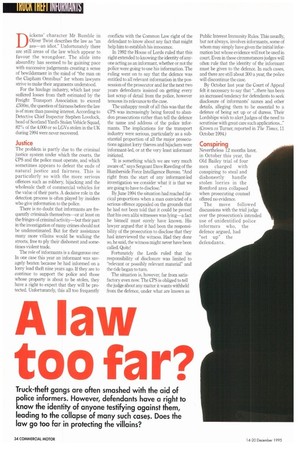A law
Page 36

Page 37

If you've noticed an error in this article please click here to report it so we can fix it.
too far?
Truck-theft gangs are often smashed with the aid of police informers. However, defendants have a right to know the identity of anyone testifying against them, leading to the collapse of many such cases. Does the law go too far in protecting the villains?
Dickens' character Mr Bumble in Oliver Twist describes the law as "an ass—an idiot." Unfortunately there are still areas of the law which appear to favour the wrongdoer. The slide into absurdity has seemed to be gaining pace with successive judgements creating a sense of bewilderment in the mind of "the man on the Clapham Omnibus" for whom lawyers strive to make their arguments understood.
For the haulage industry, which last year suffered losses from theft estimated by the Freight Transport Association to exceed ,1.300m, the question of fairness before the law is of more than passing interest. According to Detective Chief Inspector Stephen Lovelock, head of Scotland Yard's Stolen Vehicle Squad, 82% of the 4,000 or so LGVs stolen in the UK during 1994 were never recovered.
Justice
The problem is partly due to the criminal justice system under which the courts, the CPS and the police must operate, and which sometimes appears to defeat the ends of natural justice and fairness. This is particularly so with the more serious offences such as robbery, hijacking and the wholesale theft of commercial vehicles for the value of their parts. A decisive role in the detection process is often played by insiders who give information to the police.
There is no doubt that informants are frequently criminals themselves—or at least on the fringes of criminal activity—but their part in the investigation of many crimes should not be underestimated. But for their assistance many more villains would be walking the streets, free to ply their dishonest and sometimes violent trade.
The role of informants is a dangerous one: In one case this year an informant was savagely beaten because he had informed on a lorry load theft nine years ago. If they are to continue to support the police and those whose property is about to be stolen, they have a right to expect that they will be protected. Unfortunately, this all too frequently conflicts with the Common Law right of the defendant to know about any fact that might help him to establish his innocence.
In 1992 the House of Lords ruled that this right extended to knowing the identity of anyone acting as an informant, whether or not the police were going to use his information. The ruling went on to say that the defence was entitled to all relevant information in the possession of the prosecutor and for the next two years defendants insisted on getting every last scrap of detail from the police, however tenuous its relevance to the case.
The unhappy result of all this was that the CPS was increasingly being forced to abandon prosecutions rather than tell the defence the name and address of the police informants. The implications for the transport industry were serious, particularly as a substantial proportion of all the major prosecutions against lorry thieves and hijackers were informant-led, or at the very least informant initiated.
"It is something which we are very much aware of," says Sergeant Dave Rawding of the Humberside Force Intelligence Bureau. "And right from the start of any informant-led investigation we consider what it is that we are going to have to disclose."
By June 1994 the situation had reached farcical proportions when a man convicted of a serious offence appealed on the grounds that he had not been told that it could be proved that his own alibi witnesses was lying—a fact he himself must surely have known. His lawyer argued that it had been the responsibility of the prosecution to disclose that they had interviewed the witness. Had they done so, he said, the witness might never have been called. Quite!
Fortunately the Lords ruled that the responsibility of disclosure was limited to "relevant or possibly relevant material" and the tide began to turn.
The situation is, however, far from satisfactory even now. The CPS is obliged to tell the judge about any matter it wants withheld from the defence, under what are known as Public Interest Immunity Rules. This usually, but not always, involves informants, some of whom may simply have given the initial information but whose evidence will not be used in court. Even in these circumstances judges will often rule that the identity of the informant must be given to the defence. In such cases, and there are still about 300 a year, the police will discontinue the case.
By October last year the Court of Appeal felt it necessary to say that "...there has been an increased tendency for defendants to seek disclosure of informants' names and other details, alleging them to be essential to a defence of being set up or of duress. Their Lordships wish to alert Judges of the need to scrutinise with great care such applications.: (Crown us Turner, reported in The Times. 11 October 1994.)
Conspiring
Nevertheless 12 months later, in October this year, the Old Bailey trial of four men charged with conspiring to steal and dishonestly handle stolen lorries in the Romford area collapsed when prosecuting counsel offered no evidence.
The move followed discussions with the trial judge over the prosecution's intended use of unidentified police informers who, the defence argued, had "set up" the defendants. Two of the defendants had also been charged with kidnapping the driver of one of the lorries and it had been alleged that all had been involved in the theft of 12 trailer loads and sometimes the entire lorry, worth about 1.5in over two years.
So the problem for the haulage industry continues and nothing which the courts have ruled over the past three-and-a-half years has altered the fundamental principle that the defendant has a right of access to relevant information.
According to the CPS it is difficult to imagine that the courts will not regard the iden tity of an infor mant as relevant to the case for the defence. "The defence will always claim that the identity of an informant is relevant." says a spokesman. "While every case must turn on its facts, in the end it is a matter for the trial judge to decide on the question of relevancy but I would be very surprised if a court were to decide that the identity of an informant were not relevant."
There is no question that a person is entitled to know who is giving evidence against him and be provided with the opportunity of questioning him. Nor is there any doubt that the identity of an infor mant who takes part in the crime should be made known. But the demands of the defence go beyond that and often amount to a "fishing"exercise where everything is asked for just in case it contains something useful. Unfortunately it is the haulage industry which appears to be the greatest loser, "We weigh in the balance the rights of the defendant to be fully informed of the evidence that is in our possession and the identity of the person providing that evidence," says the CPS. "A disproportionately high number of discontinued cases involves HMIs."
Even the new Criminal Procedures and Investigations Bill currently going through Parliament will not make much of a difference. Although it is designed to give better protection to informants by changing the rules under which they can be used, it does not alter the basic principle that the defendant is entitled to all relevant information about his case with all that implies in terms of convicting the guilty as well as acquitting the innocent.
Li by Patrick Hook












































































































